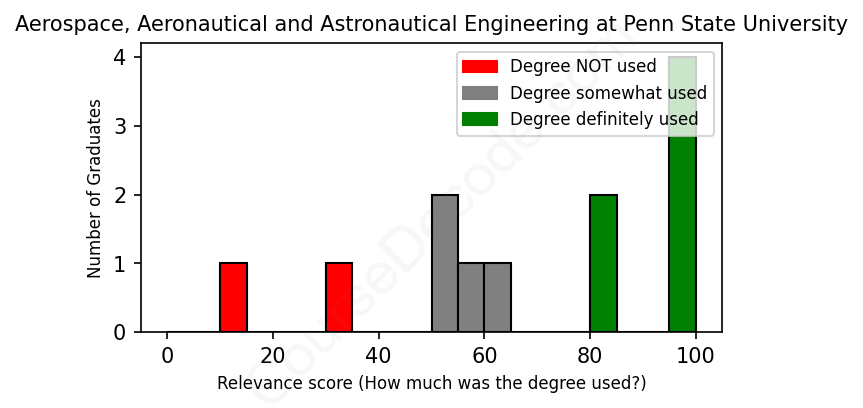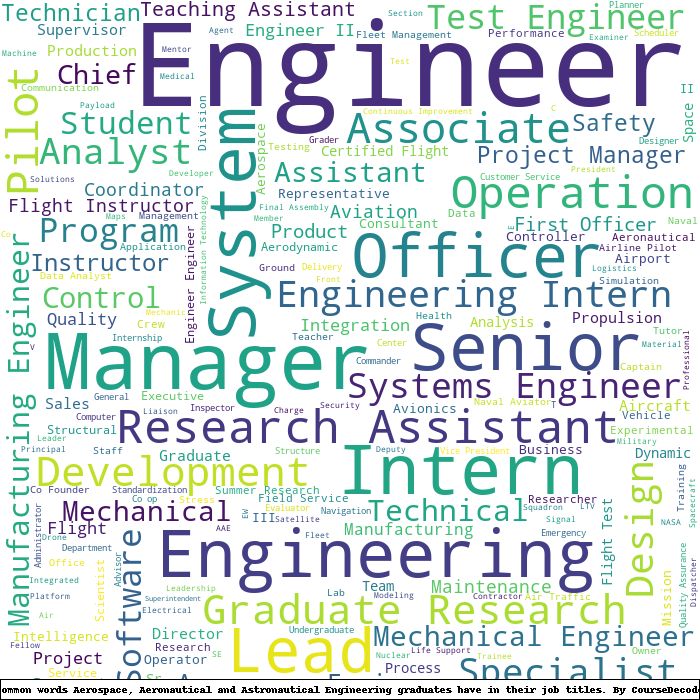
First, some facts. Of the Aerospace, Aeronautical and Astronautical Engineering graduates from Penn State University we've analyzed , here's how many have used (or NOT used) their degree in their career:

These are estimates based on AI analysis of 12 LinkedIn profiles (see below).
The verdict? Slightly above average. Overall, with an average relevance score of 68%, Aerospace, Aeronautical and Astronautical Engineering graduates from Penn State University have a slightly higher likelihood (+1%) of finding work in this field compared to the average graduate across all fields:
And for comparison, here's the chart for all profiles we've looked at across all degrees.
Also, after graduating, 50% of these graduates have pursued further education other than another Bachelor's degree (such as a Masters degree or other), compared to the average across all profiles of 35%. This suggests you may need more than just a Bachelors degree to be competitive as a Aerospace, Aeronautical and Astronautical Engineering graduate.
See the details:
|
Relevance score: 50% We think this person has gone into a career only somewhat relevant to their degree. We think this person has gone into a career only somewhat relevant to their degree.
DEGREE INFOGraduated in 2018 from Penn State University with a Bachelor's degree in Aerospace, Aeronautical and Astronautical Engineering. Also pursued further education since (see below). JOB HISTORY SINCE GRADUATIONSoftware Engineer Intern Cohesity May 2021 - Present FURTHER DEGREES DONE SINCE GRADUATINGMaster's degreePenn State University 2017 - 2019 Master's degree Georgia Institute of Technology 2019 - 2021 ABOUTNo information provided. |
The top 10 most common jobs done by the graduates we've analyzed (ranked most common to least) are:
When looking at the careers of folks who graduated with an Aerospace, Aeronautical, and Astronautical Engineering degree from Penn State University, it’s clear that there is a broad mix of professional roles they have taken on. A number of them have landed jobs in classic aerospace positions like Aeronautical Engineers, Systems Engineers, and even Mechanical Engineers at major companies like Lockheed Martin and GE Aviation. These roles closely align with their education and consistently apply aerospace engineering principles. However, there are also many individuals who have ventured into areas that don’t seem directly tied to their field, such as business development, marketing analysis, and even healthcare documentation as a medical scribe.
Overall, it seems that while there is a solid portion of graduates working in related aerospace roles, there are just as many who are utilizing only bits and pieces of their engineering backgrounds in non-engineering fields. Their jobs range from hands-on engineering roles that apply their academic training directly to more peripheral positions where the connection to aerospace engineering is somewhat diluted. While the degree certainly offers foundational skills that can be valuable in various industries, it’s interesting to see how many graduates are not sticking strictly to traditional aerospace jobs. This mix highlights the versatility of an engineering background but also raises questions about whether the alignment between education and career is as strong as it could be for many graduates.
Here is a visual representation of the most common words in job titles for Aerospace, Aeronautical and Astronautical Engineering graduates (this is across all Aerospace, Aeronautical and Astronautical Engineering graduates we've analyzed, not just those who went to Penn State University):

Graduates from Penn State University with degrees in Aerospace, Aeronautical, and Astronautical Engineering generally have a solid start to their careers, with many finding roles that are directly relevant to their studies right out of college. For instance, early positions often include titles like engineers at major aerospace companies such as Lockheed Martin, Northrop Grumman, and GE Aviation, as well as internships that provide valuable experience in the industry. Many graduates seem to quickly climb the ladder, with several of them holding leadership positions or specialized roles just a few years into their careers. This suggests that a degree from Penn State is well-regarded in the aerospace field, providing grads with the tools they need to succeed and advance in their careers.
Over the years, these graduates tend to remain within the aerospace sector, with many progressing into more complicated roles or switching to innovative positions in related fields, like engineering leadership development and technical research management. However, there are a few outliers who pursue careers that diverge from traditional aerospace engineering, such as roles in software engineering or business analysis at firms like Accenture. Overall, it appears that most alumni from this program find successful paths that utilize their specialized skills, suggesting a strong correlation between their education and their career trajectories in aerospace and related industries.
Honestly, pursuing a Bachelor’s degree in Aerospace, Aeronautical, and Astronautical Engineering is no walk in the park, and Penn State is no exception to that. It’s a pretty intense program filled with challenging coursework, lots of math and physics, and hands-on projects that can really test your problem-solving skills. You'll be diving deep into complex topics like fluid dynamics and materials science, not to mention the heavy workload that can pile up with labs and design projects. While it can definitely be tough, many students find the experience rewarding and worth the effort, especially if they're passionate about the field. So, if you’re considering it, be ready to hit the books and stay committed!
Most commonly, in the LinkedIn profiles we've looked at, it takes people 4 years to finish a Bachelor degree in Aerospace, Aeronautical and Astronautical Engineering.
From what I can see, it looks like these Penn State aerospace and aeronautical engineering grads have generally done pretty well money-wise. Many of them landed solid positions at big-name companies like Lockheed Martin and GE Aviation not long after graduation, which usually translates to decent salaries, especially in engineering fields. For instance, those who worked at places like NAVAIR or UPS are likely pulling in good salaries, and you can bet the guys at Lockheed and GE aren't too shabby in that department either. Plus, their career trajectories suggest room for growth—for example, one grad moved up from Design Engineer I to Team Lead in just a few years, which usually comes with pay raises. So yeah, overall, it seems like they’ve been able to secure some solid jobs and should be making a decent living!
Here is a visual representation of the most common words seen in the "about" section of LinkedIn profiles who have a Bachelor degree in Aerospace, Aeronautical and Astronautical Engineering (this is across all Aerospace, Aeronautical and Astronautical Engineering graduates we've analyzed, not just those who went to Penn State University). This may or may not be useful:

Here are all colleges offering a Bachelor degree in Aerospace, Aeronautical and Astronautical Engineering (ordered by the average relevance score of their Aerospace, Aeronautical and Astronautical Engineering graduates, best to worst) where we have analyzed at least 10 of their graduates:
| College | Score | Count |
|---|---|---|
 Texas A&M University Texas A&M University
|
87 | 22 |
 California Polytechnic State University-San Luis Obispo California Polytechnic State University-San Luis Obispo
|
86 | 12 |
 University of Cincinnati University of Cincinnati
|
86 | 10 |
 Purdue University Purdue University
|
85 | 40 |
 Rensselaer Polytechnic Institute Rensselaer Polytechnic Institute
|
85 | 17 |
 Georgia Institute of Technology Georgia Institute of Technology
|
84 | 23 |
 Liberty University Liberty University
|
81 | 21 |
 Iowa State University Iowa State University
|
80 | 16 |
 University of Colorado Boulder University of Colorado Boulder
|
80 | 13 |
 California State Polytechnic University-Pomona California State Polytechnic University-Pomona
|
79 | 13 |
 United States Naval Academy United States Naval Academy
|
77 | 12 |
 The Ohio State University The Ohio State University
|
76 | 20 |
 University of Central Florida University of Central Florida
|
75 | 25 |
 Arizona State University Arizona State University
|
74 | 12 |
 University of Michigan University of Michigan
|
74 | 10 |
 Embry-Riddle Aeronautical University Embry-Riddle Aeronautical University
|
71 | 163 |
 Penn State University Penn State University
|
68 | 12 |
 Florida Institute of Technology Florida Institute of Technology
|
67 | 20 |
 The University of Alabama in Huntsville The University of Alabama in Huntsville
|
67 | 11 |
 Embry Riddle Aeronautical University-Worldwide Embry Riddle Aeronautical University-Worldwide
|
66 | 10 |
 University of Illinois at Urbana-Champaign University of Illinois at Urbana-Champaign
|
48 | 10 |